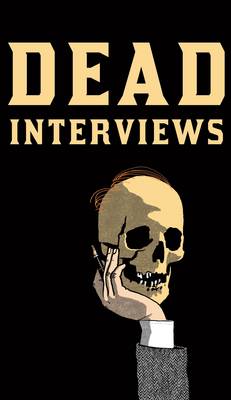
These ingenious interviews will amuse, provoke and delight. Veering from the intensely serious to the wildly silly, Dead Interviews grants writers the chance to sit down with their heroes and flex their cerebral muscles, or simply indulge in some bookish gossip with a deceased icon. Pitch-perfect mimesis meets razor sharp literary criticism in the book that refuses to let dead writers lie.
The contributors:
Rick Moody on Jimi Hendrix, Cynthia Ozick on Henry James, Douglas Coupland on Andy Warhol, Sam Leith on John Berryman, Geoff Dyer on Friedrich Nietzsche, A. M. Homes on Richard Nixon, David Mitchell on Samuel Johnson and James Boswell, John Burnside on Rachel Carson, ZZ Packer on Monsieur de Saint-George, Michel Faber on Marcel Duchamp, Rebecca Miller on the Marquis de Sade, Ian Rankin on Arthur Conan Doyle and Joyce Carol Oates on Robert Frost.
Several modern day writers answer the question, if you could go back in time and talk to any famous writer, who would it be? by imagining how such interviews would go.
Some are straight-forward, some are really very clever, like the Samuel Johnson/Boswell interview imagined by David Mitchell, or Rebecca Miller's take on how an interview would go with the Marquis de Sade. Some of them aren't even authors; Douglas Coupland interviews Andy Warhol, who he imagines finds heaven very dull.
I bought this because I saw Sir Arthur Conan Doyle on the list and he's just about the only author I'd travel back in time to talk to, if I could. Ian Rankin did the honours, but I was rather disappointed with his efforts, to be frank. Very little came out of the exercise except perhaps a wicked hangover for Rankin if he was lucky, a court-ordered psych eval if he wasn't (fictitiously speaking, of course).
The weirdest by far was Joyce Carol Oates' disturbing and intensive extended grilling of Robert Frost. I think it's fair to say, fictional imaginings or not, she does not like Robert Frost! At the end of it, she is careful to remind readers it's a work of fiction, "though based opon (limited, selected) historical research", and then points the reader in the direction of Meyer's biography of Frost. I'm betting there's a story to tell there somewhere.
It's an amusing collection of what-ifs, some of which, like with all such things, are better than others.
Reading updates
-
Started reading
-
18 April, 2017:
Finished reading
-
18 April, 2017:
Reviewed
